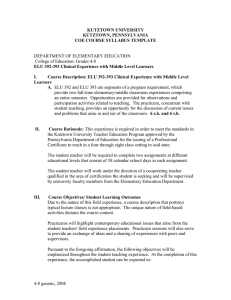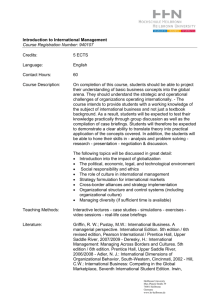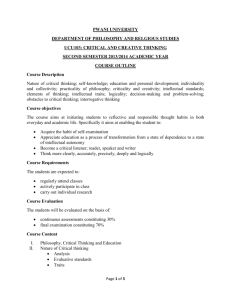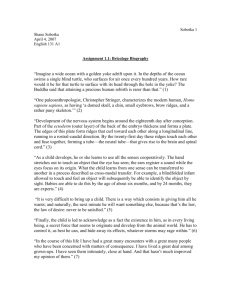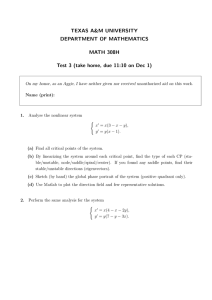DEPARTMENT OF ELEMENTARY EDUCATION College of Education: Grades Pre-K-4 Program KUTZTOWN UNIVERSITY
advertisement
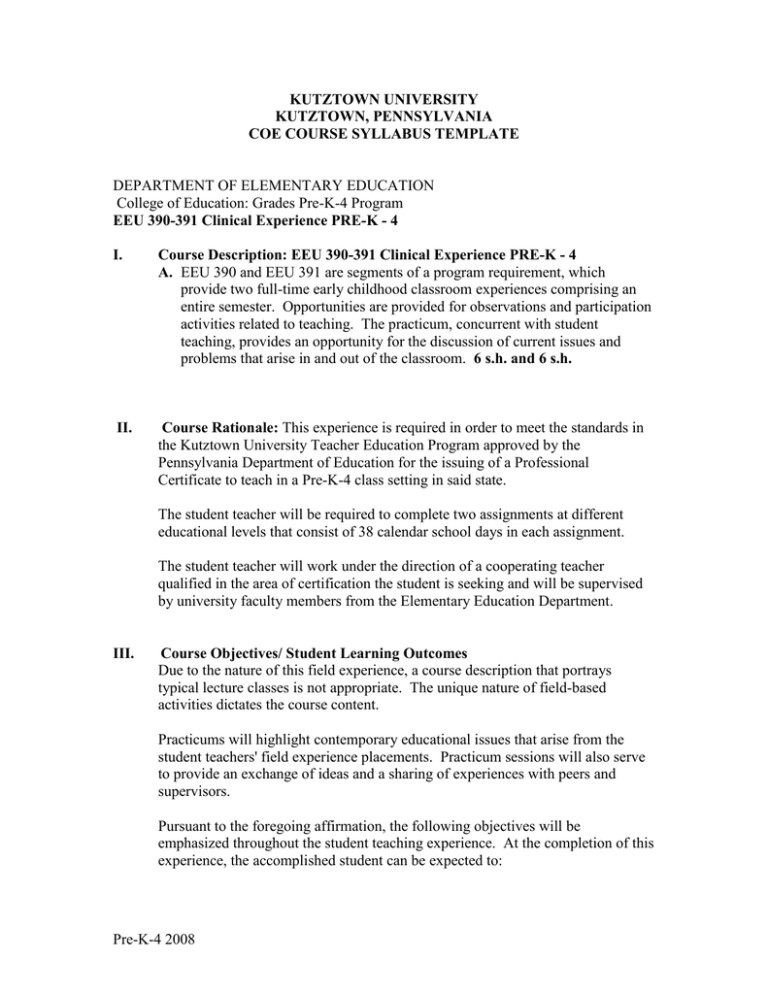
KUTZTOWN UNIVERSITY KUTZTOWN, PENNSYLVANIA COE COURSE SYLLABUS TEMPLATE DEPARTMENT OF ELEMENTARY EDUCATION College of Education: Grades Pre-K-4 Program EEU 390-391 Clinical Experience PRE-K - 4 I. Course Description: EEU 390-391 Clinical Experience PRE-K - 4 A. EEU 390 and EEU 391 are segments of a program requirement, which provide two full-time early childhood classroom experiences comprising an entire semester. Opportunities are provided for observations and participation activities related to teaching. The practicum, concurrent with student teaching, provides an opportunity for the discussion of current issues and problems that arise in and out of the classroom. 6 s.h. and 6 s.h. II. Course Rationale: This experience is required in order to meet the standards in the Kutztown University Teacher Education Program approved by the Pennsylvania Department of Education for the issuing of a Professional Certificate to teach in a Pre-K-4 class setting in said state. The student teacher will be required to complete two assignments at different educational levels that consist of 38 calendar school days in each assignment. The student teacher will work under the direction of a cooperating teacher qualified in the area of certification the student is seeking and will be supervised by university faculty members from the Elementary Education Department. III. Course Objectives/ Student Learning Outcomes Due to the nature of this field experience, a course description that portrays typical lecture classes is not appropriate. The unique nature of field-based activities dictates the course content. Practicums will highlight contemporary educational issues that arise from the student teachers' field experience placements. Practicum sessions will also serve to provide an exchange of ideas and a sharing of experiences with peers and supervisors. Pursuant to the foregoing affirmation, the following objectives will be emphasized throughout the student teaching experience. At the completion of this experience, the accomplished student can be expected to: Pre-K-4 2008 1. 2. 3. 4. 5. 6. 7. 8. 9. 10. 11. 12. 13. 14. 15. 16. A. Know the growth and learning patterns of children. Demonstrate an understanding of curriculum content used in the classroom. Organize learning and teaching materials for effective use in the classroom environment Assist learners in experiencing success by motivating and challenging them to achieve their objectives Know, use and interpret formal and informal assessment strategies to enhance instruction and ensure intellectual, emotional, social, and physical development of all learners. Use their knowledge of individual learner needs to support the learning environment by engaging all students in learning. Establish and maintain appropriate management strategies to support the learning environment of the classroom. Appreciate diversity and use that knowledge to foster learning that meets the needs of all students. Engage in teaching techniques and strategies that motivate all children to learn. Model and teach the process of critical thinking. Practice human relations skills appropriate to a multicultural environment. Work cooperatively and productively with school personnel and parents. Exhibit sufficient confidence to deal successfully with the routine and ongoing challenges that occur in the classroom. Exhibit knowledge of educational issues "beyond the classroom. Demonstrate the confidence to become a risk taker and act as a change agent regarding educational issues. Display reflective practice, positive dispositions, pride in teaching and professional development Relationship to Standards Course Objectives/ Student Learning Outcomes 1. Know the growth and learning patterns of children. 2. Demonstrate an understanding of curriculum content used in the classroom. 3. Organize learning and teaching materials for effective use in the classroom environment 4. Assist learners in experiencing success by motivating and challenging them to achieve their objectives. 5. Know, use and interpret formal and informal assessment strategies to Pre-K-4 2008 PDE NAEYC INTASC PDE 430 II. D. 1. 2.. Category I II. B 4, 4c, 4d. 1, 7. Category I II A, II B, II C., II D. 4., 4b, 4d 1, 2 , 3, 6. Category I : II. B, II C, II D, II F. 4.,4b, 4c, 4d. 1, 2, 3, 4, 6, 7 Category I Category III II B, II D, II E, II F 1, 3 1, 7, 8 Category I : Category III enhance instruction and ensure intellectual, emotional, social, and physical development of all learners. 6 Use their knowledge of individual II A learner needs to support the learning environment by engaging all students in learning. 7. Establish and maintain appropriate II A management strategies to support the learning environment of the classroom. 8. Appreciate diversity and use that II D knowledge to foster learning that meets the needs of all students. 9. Engage in teaching techniques and II B, II C, II strategies that motivate all children to D learn. 10. Model and teach the process of II D critical thinking 11. Practice human relations skills III. B, III C, appropriate to a multicultural III. D. environment 12. Work cooperatively and III B, III C, productively with school personnel and III D parents. 13. Exhibit sufficient confidence to III B, III C, deal successfully with the routine and III D ongoing challenges that occur in the classroom. 14. Exhibit knowledge of educational III A, III D issues” beyond the classroom 15. Demonstrate the confidence to III B become a risk taker and act as a change agent regarding educational issues. 16. Display reflective practice, positive III A, III B dispositions, pride in teaching and professional development. B. Relationship to Conceptual Framework: Kutztown University Conceptual Framework 1. 2, 3, 5, 6, 7. Category II: 1, 4, 4b, 4d. 5. Category II: 1, 4b 3. Category II: 1, 4b, 4d. 1, 4, 5, 6, 7 Category II: Category III 4d. 4. Category III 4., 4a, 5. 9 Category IV: 2, 4, 4a, 5. 9. Category IV: 5 9 Category IV: 5. 9. Category IV: 5. 9. Category IV: 5. 9. Category IV: EEU 390-391 demonstrates the subsequent categories in the conceptual framework in the following ways: Professional Methodology is exhibited by student teachers through use of varied strategies and techniques, the application of theory and methods, the use of technology and varied materials/aids in the planning and the implementation of lessons. Positive dispositions for teaching, such as passion, compassion, enthusiasm, initiative, etc. are an integral part of the teacher candidates’ experience. Communication skills are evident in both the oral and written use of Standard English within the classroom setting and seminar. Appropriate voice modulation, articulation and expressions are expected. Interpersonal Skills are demonstrated through the establishment of a positive rapport with students, the cooperating teacher, supervisor, faculty, staff and parents. Pre-K-4 2008 Critical Thinking is generated by the types of questions and discussions generated in the field placement and seminar by the student teacher. Scholarly Inquiry is best demonstrated by the unit that student teachers research, plan and teach in the first assignment. Reflection is the key to an effective teacher and is demonstrated in journal entries, personal reflections at the end of a lesson plan, and constructive critiques following lesson observations with the cooperating teacher and/or supervisor. Candidates rely on their content knowledge to integrate disciplines into the lesson taught during the field assignment. An awareness and acceptance of cultural diversity is exhibited by the ways that student teachers work with and respond to diverse individuals in the classroom. Organization and classroom management is evident by the decisions and proactive stance of the student teacher in the ongoing situations that arise in a classroom everyday. Candidates demonstrate effective management and discipline in the field assignment. Technology is integrated in lessons during the field placement and must be demonstrated in the unit. Candidates visit the instructor’s web site, Teacher Tips, and add a tip of their own. IV. Assessment A. Core Assignment Will be added when faculty teach the course B. Other Assessments based on a subset of the following: 1. 2. 3. 4. V. Lesson observations by the university supervisor Teaching assessment via lesson observation by the cooperation teacher Conclusions reached via cooperating teacher/university supervisor conference Pennsylvania Statewide Evaluation Form for Student Professional Knowledge and Practice (PDE 430) – two assessments, one for each placement Course Outline A. No course outline METHODS OF TEACHING A. B. Observation and practice under supervised field internship. Campus seminars COURSE REQUIREMENTS A. B. C. D. E. Pre-K-4 2008 Complete two Eight-Week internships in Pre-K-4 classrooms. Participate in campus practicum sessions. Submit weekly teaching schedules. Write and submit appropriate lesson plans. Develop and teach a comprehensive unit. VI. Instructional Resources Allen, Richard H. (2001). Impact Teaching. Boston, MA: Allyn & Bacon. Anderson, Debra J., Major, Robert L. and Mitchell, Richard R. (1992). Teacher Supervision That Works. New York: Praeger Publishers. Bennett, Donna I., Meyer, Charlotte H. and Meyer D. Eugene. (1994). Elementary Field Experiences A Handbook With Resources. Albany, NY: Delmar Publishers Inc. Bluestein, Janet E. (1988). Being A Successful Teacher. Belmont, CA: Lake Publications. Borich, Gary. (2002). Observation Skills for Effective Teaching, (Fourth edition). Upper Saddle River, NJ: Prentice Hall. Campbell, Dorothy M., Cignotti, Pamela Bondi, Melenyzer, Beverly J., Nettles, Diane H. and Wyman, Richard M. (2000). How to Develop a Professional Portfolio: A Manual for Teachers. (Second edition). Boston, MA: Pearson. Charles, C. M. and Senter, G. (2005)). Building Classroom Discipline. (Eighth Edition). New York: Longman Publishing Group. Clark, D. Cecil and Cutter, Beverly Romney. (1990). Teaching. An Introduction. New York: Harcourt Brace Jovanovich, Publishers. Constantino, Patricia M. and DeLorenzo, Marie N. (2002). Developing a Professional Teaching Portfolio. Boston, MA: Allyn & Bacon. Chrisman, K. & Couchenour, D. ( 2008). In the field: Guided Field Assignments and Readings in Early Childhood Education. Clifton Park, NY: Thomson Delmar Learning. Eby, Judy W. and Martin, Debra Bayles. (2001). Reflective Planning, Teaching, and Evaluation for the Elementary School. (Third edition). Upper Saddle River, NJ: Prentice Hall. Enz, B. J., Cook, S. J. and Weber, B. J. (1992). Professional Partnerships. 2nd Ed. Dubuque, Iowa: Kendall/Hunt Publishing Company. Frazee, Bruce M. and Rudnitski, Rose A. (1995). Integrated Teaching Methods: Theory, Classroom Applications, and Field-Based Connections. (1995). Albany Publishers, NY: Delmar Publishers. Gollnick, Donna M. and Chinn, Philip C. (2001). Multicultural Education in a Pluralistic Society. (Sixth edition). Upper Saddle River, NY: Prentice Hall. Grant, Carl and Sleeter, Christina E. (2002). Turning on Learning: Five Approaches for Multicultural Teaching Plans for Race, Class, Gender And Disability. New York: Wiley Text Books Grounlund, Norman E. (2003). Writing Instructional Objectives for Teaching and Assessment. (Seventh edition). Upper Saddle River, NJ: Prentice Hall. Hilke, Eileen V. (1989). Supervising the Student Teacher for Success. Saratoga, CA: R & E Publishers. Pre-K-4 2008 Hollingsworth, Paul M. and Hoover, Kenneth H. (1991). Elementary Teaching Methods. Boston: Allyn and Bacon. J ablon, J. R., Dombro, A. L. and Dichtelmiller, M. L. (1999). The Power of Observation. Teaching Strategies Inc. Jackson, Philip W. (1990). Life in Classrooms. New York: Teachers College Press. Jarolimek, John, Foster, Clifford D. and Kellough, Richard D. (2004). Teaching and Learning in the Elementary School. (Eighth edition). Upper Saddle River, NJ: Prentice Hall. Kellough, Richard D. and Roberts, Patricia L. (2001). A Resource Guide for Elementary School Teaching: Planning for Competence. (Fifth edition). Upper Saddle River, NJ: Prentice Hall. Klingele, William E. (1987). Classroom Laboratory, and Clinical Activities for Teacher Education. Boston: Allyn and Bacon, Inc. Kreamelmeyer, F. D. (1991). Successful Student Teaching. Salem, WI: Sheffield Publishing Co. Lemlech, Johanna Kasin. (2001). Curriculum and Instructional Methods for the Elementary and Middle School. (Fifth edition). Upper Saddle River, NJ: Prentice Hall. _________, Kasin, Johanna. (1998). Classroom Management: Methods and Techniques for Elementary and Secondary Teachers. New York: Waveland Press. MacDonald, Robert E. and Healy, Sean D. (1999). A Handbook for Beginning Teachers. (Second edition). New York: Addison-Wesley Pub. Co, Machado, Jeanne M. and Botnarescue, Helen Meyer. (2000). Student Teaching. Early Childhood Practicum Guide. NY: Delmar Publishers Inc. Pitton, Debra Eckerman. (1997). Stories of Student Teaching: A Case Approach To the Student Teaching Experience. Boston, MA: Pearson. Posner, George J. (2000). Field Experience: A Guide to Reflective Teaching. (Fifth edition). White Plains, NY: Longman Publishing Group. Rand, Muriel K. and Colangelo, Sharon Shelton. (2002). Voices of Student Teachers: Cases From the Field. (Second edition). Upper Saddle River, NJ: Prentice Hall. Roe, Betty D. and Ross, Elinor P. (2001). Student Teaching and Field Experiences Handbook. (Fifth edition). Upper Saddle River, NJ: Prentice Hall. Rosenblun-Lowden, R. (2000). You Have to Go to School – You’re the Teacher! Schwebel, Andrew L., Schwebel, Bernice L., Schwebel, Carol R., Schwebel, Milton. (1996). The Student Teacher's Handbook. Hillsdale, NJ: Lawrence Erlbaum Associates Inc., Publishers. Slavin, Robert E. (1990). Cooperative Learning. Needham Heights, MA: Allyn and Bacon. Sleeter, Christina E. and Grant, Carl A. (2002). Making Choices for Multicultural Education. NY: Wiley Text Books. Pre-K-4 2008 Thomas, C. C., Correa, V. and Morsink, C. (2000). Interactive Teaming: Enhancing Programs for Students with Special Needs. (Third edition). Upper Saddle River, NJ: Prentice Hall. Wentz, Patricia J. (2000). The Student Teaching Experience: Cases From the Classroom. Upper Saddle River, NJ: Prentice Hall. Wentz, Patricia J. and Yarling, James R. (1994). Student Teaching Casebook for Supervising Teachers and Teaching Interns. New York: Merrill Publishing Co. Wicker, Peggy E. and Schultz, Harriet. (1995). The ABC’s of Running an Elementary Classroom. New York: Delmar Publishers. Video Program Mentoring the New Teacher 8 Case Studies - (1994) 1. 2. 3. 4. 5. 6. 7. 8. Dealing with Students’ Personal Problems Classroom Discipline Planning Classwork Lack of Instructional Resources Parent Relations Motivating Students Dealing with Individual Differences Evaluating Student Work Alexandria, VA: ASCD Revised: Sychterz, 2008 Pre-K-4 2008
